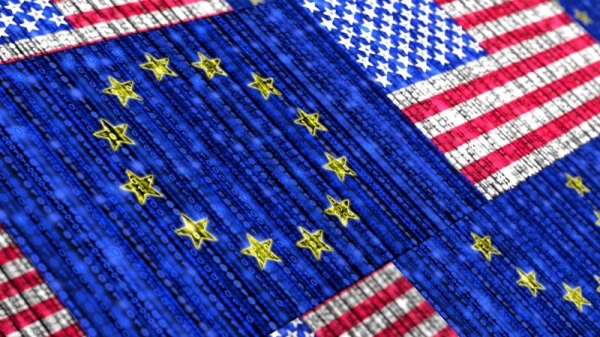The US- European tech partnership should be renewed and deepened

The transatlantic partnership displayed remarkable unity in the face of Russia’s aggression against Ukraine but with emerging technology critical to the global fight for democracy, an acceleration in cooperation must underpin global democratic leadership.
France’s President Emmanuel Macron contends that Europe should pursue its own strategic autonomy. In his telling, the result is a stronger Europe contributing to a stronger Western alliance of democracies.
Yet, President Macron’s recent comments on Taiwan and the transatlantic alliance weakened both, as they created cracks in the transatlantic relationship, sending a message to the rest of the world about our disunity and ultimately emboldening autocrats.
Instead of transatlantic dissembling, now is the time for a renewal of our partnership, and the basis of such a renewal should be technology cooperation.
The war in Ukraine has been discussed as the “first networked war.” Technological capabilities, from cyber, to drones, and low-earth orbit telecommunications, are transforming warfighting.
Private sector companies provide novel support, including network connectivity, cybersecurity, cataloguing human rights abuses, protecting official data in the cloud, and providing continuous access to online education and government services.
The war in Ukraine has demonstrated what technology can do to support and defend a nation’s democracy and sovereignty. Yet it can be equally powerful in enabling autocrats. We cannot underestimate the danger of ceding technology leadership to autocracies.
Chinese President Xi Jinping has been explicit about his goals to make his country global leader in AI and other critical technologies. China is organised, has the strategies in place, and is committing the resources to dominate these new commanding heights of the global economy.
Xi’s recent visit to Moscow and his “no limits partnership” with Putin should be an unmistakable signal of the leadership challenge democracies face.
While we should take heed of the unified transatlantic response to Russia’s invasion of Ukraine, it has not yet manifested itself in other economic and political fields. For example, the Trade and Technology Council, an essential channel for cooperation, has revived important conversations across the Atlantic, but it has yet to find its full capacity needed for the current times.
Both the United States and the European Union are moving on domestic technology policies, but progress on joint deliverables remains limited to small projects, and continuing tensions around trade and protectionism divert attention from deeper cooperation.
The United States and the EU should seize the window of opportunity that our unity in Ukraine has created to align a shared vision for what a technology-enabled democratic future can look like. This window is narrowing, and attention will diminish as we will soon bump up against political cycles in the United States, Europe, and elsewhere in 2024. We can start with three key steps.
First, we should agree on a list of critical technologies in which we need democratic leadership. New energy storage and generation, next-generation networks, novel microelectronics and computing paradigms, smart manufacturing, biotechnology, and the next frontiers of AI all capture critical elements of power in national security, economic prosperity, and individual expression.
The United States, the EU, and other allies and partners should focus, organise, and lead in these technologies.
Next, we need to align our resources and investments to build out the alliance infrastructure, institutions, and innovation ecosystems to support alliance cooperation in these technology sectors.
This means investing in the industrial strength of our nations to restore the necessary means of production in these tech sectors; reskilling our people for the economy of the future; bolstering our people-to-people connections to foster the intellectual exchange between democratic societies; and building new alliance institutions as needed to help us deepen our technology cooperation.
Lastly, we must deconflict our national approaches to regulation, however different they may be across our political systems, to support an alliance approach to technology. We should start from the basis that we can trust each other to resolve practical regulatory differences rather than letting such differences stymie cooperation and innovation.
The values that unite us across the Atlantic should override short-term interests and make our differences trivial. As we continue to support Ukraine, we must also capitalise on our current unity, look to the future, and cement a strategic alignment on the technologies that will shape the world of tomorrow.
Instead of creating the “third pole” that President Macron argued, we must develop and advance the democracy technology pole.



